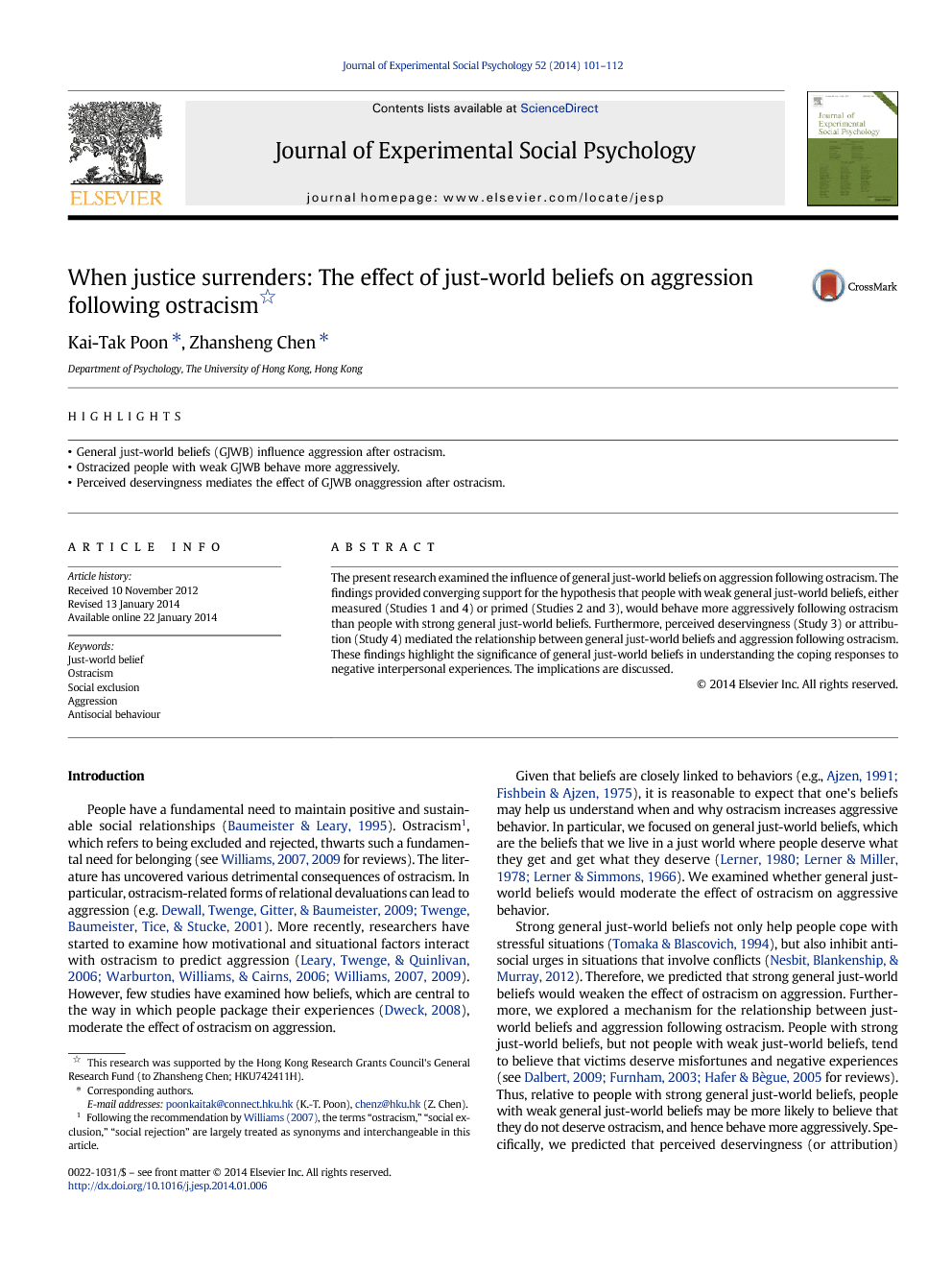The present research examined the influence of general just-world beliefs on aggression following ostracism. The findings provided converging support for the hypothesis that people with weak general just-world beliefs, either measured (Studies 1 and 4) or primed (Studies 2 and 3), would behave more aggressively following ostracism than people with strong general just-world beliefs. Furthermore, perceived deservingness (Study 3) or attribution (Study 4) mediated the relationship between general just-world beliefs and aggression following ostracism. These findings highlight the significance of general just-world beliefs in understanding the coping responses to negative interpersonal experiences. The implications are discussed.
People have a fundamental need to maintain positive and sustainable social relationships (Baumeister & Leary, 1995). Ostracism1, which refers to being excluded and rejected, thwarts such a fundamental need for belonging (see Williams, 2007 and Williams, 2009 for reviews). The literature has uncovered various detrimental consequences of ostracism. In particular, ostracism-related forms of relational devaluations can lead to aggression (e.g. Dewall et al., 2009 and Twenge et al., 2001). More recently, researchers have started to examine how motivational and situational factors interact with ostracism to predict aggression (Leary et al., 2006, Warburton et al., 2006, Williams, 2007 and Williams, 2009). However, few studies have examined how beliefs, which are central to the way in which people package their experiences (Dweck, 2008), moderate the effect of ostracism on aggression.
Given that beliefs are closely linked to behaviors (e.g., Ajzen, 1991 and Fishbein and Ajzen, 1975), it is reasonable to expect that one's beliefs may help us understand when and why ostracism increases aggressive behavior. In particular, we focused on general just-world beliefs, which are the beliefs that we live in a just world where people deserve what they get and get what they deserve (Lerner, 1980, Lerner and Miller, 1978 and Lerner and Simmons, 1966). We examined whether general just-world beliefs would moderate the effect of ostracism on aggressive behavior.
Strong general just-world beliefs not only help people cope with stressful situations (Tomaka & Blascovich, 1994), but also inhibit anti-social urges in situations that involve conflicts (Nesbit, Blankenship, & Murray, 2012). Therefore, we predicted that strong general just-world beliefs would weaken the effect of ostracism on aggression. Furthermore, we explored a mechanism for the relationship between just-world beliefs and aggression following ostracism. People with strong just-world beliefs, but not people with weak just-world beliefs, tend to believe that victims deserve misfortunes and negative experiences (see Dalbert, 2009, Furnham, 2003 and Hafer and Bègue, 2005 for reviews). Thus, relative to people with strong general just-world beliefs, people with weak general just-world beliefs may be more likely to believe that they do not deserve ostracism, and hence behave more aggressively. Specifically, we predicted that perceived deservingness (or attribution) would mediate the relationship between general just-world beliefs and aggression following ostracism.
The present research aimed to further understand when and why ostracized people behave aggressively. The current findings suggest that general just-world beliefs weaken the relationship between ostracism and aggression. After ostracism, people with weak general just-world beliefs behave more aggressively, while people with strong general just-world beliefs do not. A better understanding of the role of general just-world beliefs in one's behavior following ostracism would be helpful in uncovering the mysterious complexity of responses to ostracism.


